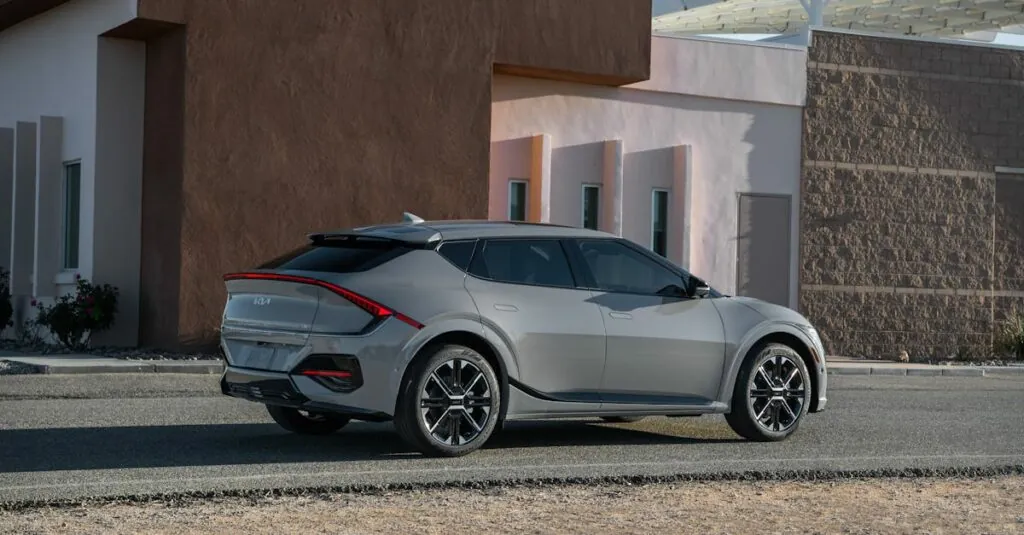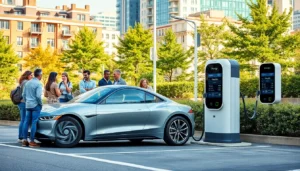Electric vehicles are no longer just a futuristic dream—they’re the reality zooming down our streets today. With a growing lineup of EV models, choosing the right one can feel like navigating a maze designed by a mischievous raccoon. From sleek sedans that whisper elegance to rugged SUVs that scream adventure, there’s an electric chariot for every personality.
Table of Contents
ToggleOverview of EV Models
Electric vehicles (EVs) encompass a variety of models, each designed to meet different consumer preferences. Buyers encounter options ranging from compact cars suitable for urban environments to spacious SUVs ideal for families. Manufacturers increasingly offer diverse EV models, catering to both budget-conscious individuals and luxury seekers.
Sedans have gained popularity among EV enthusiasts. These vehicles typically provide an optimal blend of range and efficiency, making them appealing for daily commuting. Tesla’s Model 3 exemplifies a successful sedan, boasting impressive technologies and performance metrics.
The SUV segment sees robust growth as well. Numerous automakers present electric SUVs that feature high ground clearance and ample cargo space. For instance, the Ford Mustang Mach-E stands out with its sleek design and all-wheel drive capabilities.
Compact models offer affordability and practicality. Options like the Nissan Leaf cater to those looking for an economical entry point into the EV market. Such vehicles serve well for short trips and city driving.
Luxury EVs attract attention with their advanced features and performance. Brands such as Audi and Porsche offer electric models equipped with cutting-edge technology. The Audi e-tron showcases luxurious interiors while offering a high-performance experience.
Other notable brands continue to enter the EV market, expanding consumer choices. Rivian and Lucid Motors exemplify new players seeking to disrupt traditional automotive norms with innovative designs. As demand for sustainable transportation rises, the diversity of EV models ensures that there’s an option for everyone.
Electric vehicle technology continually evolves, leading to enhanced efficiency, longer ranges, and improved charging infrastructure. These advancements influence the attractiveness of EV models significantly, reflecting shifting consumer priorities.
Types of EV Models
Various types of electric vehicle models cater to different consumer needs. Each type provides unique advantages and features that suit diverse lifestyles.
Battery Electric Vehicles (BEVs)
Battery electric vehicles operate solely on electric power. These models use large battery packs to store energy, enabling them to travel significant distances without gasoline. Tesla’s Model 3 exemplifies efficiency with a range exceeding 350 miles on a single charge. Zero tailpipe emissions highlight their environmental benefits, making them appealing for eco-conscious drivers. Charging infrastructure has also expanded, providing convenient options for home and public charging stations. Many manufacturers, including Nissan and Chevrolet, offer BEVs, which continue to enhance performance and agility in response to consumer demands.
Plug-in Hybrid Electric Vehicles (PHEVs)
Plug-in hybrid electric vehicles combine electric power with traditional gasoline engines. These models allow drivers to benefit from electric-only driving for short commutes while retaining the option of gasoline for longer trips. The Toyota Prius Prime showcases how PHEVs can efficiently blend both technologies, typically offering electric ranges of around 25 to 50 miles. Fuel efficiency gains often lower overall emissions, catering to those who desire flexibility in their driving experience. With an increasing number of automakers entering this market segment, PHEVs are becoming a popular choice for consumers seeking transitional options in electrification.
Key Features of Popular EV Models
Electric vehicles showcase a variety of innovative features that appeal to a wide audience. This section delves into key models that stand out in the market.
Tesla Models
Tesla offers several EV options, each known for impressive range and cutting-edge technology. The Model S provides extraordinary performance, achieving 0-60 mph in as little as 1.99 seconds. Model 3 focuses on affordability without sacrificing efficiency, while Model X combines utility with unique falcon-wing doors. Model Y serves as a compact SUV alternative, emphasizing spaciousness and versatility. Autopilot features contribute to enhanced safety and convenience, making Tesla a leader in the EV landscape.
Nissan Leaf
Nissan Leaf represents one of the most accessible electric cars on the market. With a range up to 226 miles, it caters to daily commuters and offers practicality. Advanced safety features include ProPilot Assist, enhancing driving confidence. The Leaf has a compact design, making it ideal for city driving. With affordability at its core, it serves as a great entry point for consumers new to electrification. Eco-friendly materials and efficient charging capabilities further enhance its appeal.
Chevrolet Bolt
Chevrolet Bolt stands out for its impressive range of up to 259 miles on a single charge. Efficient use of space inside makes it suitable for families and urban drivers alike. The vehicle features a user-friendly infotainment system and supports both Apple CarPlay and Android Auto. Moreover, regenerative braking contributes to energy efficiency during driving. Affordable pricing positions the Bolt as a competitive choice in the EV segment. Its combination of practicality and technology aligns with modern consumer expectations.
Performance and Range Comparisons
Performance and range are critical factors when selecting an electric vehicle (EV). Tesla’s Model 3 exemplifies impressive range, exceeding 350 miles on a single charge, making it appealing for long-distance travel. Range varies significantly among models. For example, the Nissan Leaf offers up to 226 miles, while the Chevrolet Bolt stands out with a range of approximately 259 miles, highlighting its suitability for urban and suburban driving.
Acceleration and speed play essential roles in performance evaluation. The Tesla Model S achieves extraordinary acceleration, reaching 0 to 60 mph in just 1.99 seconds, attracting performance enthusiasts. Models like the Ford Mustang Mach-E offer engaging driving dynamics with rapid acceleration, catering to those who prioritize a sporty driving experience.
Battery technology directly impacts both range and performance. Continuous advancements in lithium-ion batteries enhance energy density, allowing for greater ranges in newer models. The average battery capacity for most compact EVs ranges from 40 kWh to 70 kWh, supporting longer drives without frequent charging.
Charging times also influence overall usability. Tesla’s Supercharger network allows for rapid charging, providing a full battery in around 30 minutes, beneficial for road trips. In contrast, PHEVs like the Toyota Prius Prime typically require 2 to 3 hours for a complete charge, making them practical for shorter commutes.
Consumer preferences continue to shape the evolution of EV performance. Buyers prioritize efficiency in urban environments while seeking performance for recreational driving. Thus, manufacturers respond by offering a variety of EV models that cater to diverse driving needs and preferences, demonstrating a commitment to sustainable and innovative engineering.
Future Trends in EV Models
Emerging technologies shape the future of electric vehicles (EVs), driving innovation and redefining consumer expectations. Significant advancements in battery technology enhance range and performance. Solid-state batteries, for instance, promise greater energy density and faster charging times.
New design approaches focus on aerodynamics and lightweight materials to boost efficiency. Manufacturers increasingly explore vehicle-to-grid technology, allowing EVs to provide energy back to the grid, enhancing sustainability.
Autonomous driving capabilities gain traction among major automakers, with multiple companies testing self-driving features in their EV models. The integration of artificial intelligence in vehicles offers personalized driving experiences, adapting to individual preferences.
Diverse charging solutions emerge, addressing the need for faster and more convenient options. Ultra-fast charging stations, capable of delivering 350 kW, dramatically reduce charging times, providing convenience for consumers. Wireless charging technology also enters the market, simplifying the charging process for EV owners.
Government regulations and incentives encourage the transition to electric mobility. Many countries aim for substantial reductions in greenhouse gas emissions by implementing stricter emissions standards for traditional fuels.
Consumer interest in sustainability continues to grow, influencing manufacturers to adopt eco-friendly practices, including sustainable materials in production. The demand for electric SUVs and trucks rises, with models like the Rivian R1T and Ford F-150 Lightning leading the charge in the EV truck market.
Collaboration among automakers, tech companies, and energy providers creates a more robust infrastructure for EV adoption. These partnerships facilitate the development of comprehensive charging networks, supporting the rapid growth of electric mobility.
Conclusion
The electric vehicle landscape is rapidly evolving with a diverse array of models catering to every type of driver. From compact city cars to luxurious SUVs and rugged trucks, there’s an EV for everyone. As technology advances and charging infrastructure improves, these vehicles are becoming more accessible and appealing.
The growing interest in sustainability and innovative features is shaping consumer preferences and driving manufacturers to expand their offerings. With emerging technologies on the horizon, the future of electric mobility looks promising. The commitment to sustainable transportation is stronger than ever, marking a significant shift in the automotive industry. As consumers continue to embrace electric vehicles, the journey toward a greener future is well underway.










